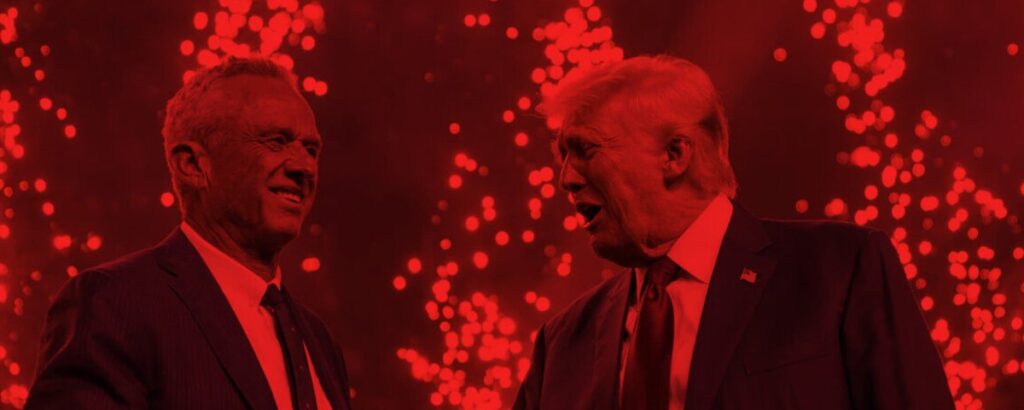
Why I’m Voting for Trump
You will be extremely hard-pressed to find many people with as much stake in the Libertarian Party as I have. I am the founder of the Mises Caucus and led a successful Ron Paul-inspired takeover of the Libertarian Party in 2022 after multiple defeats and lessons learned before that. I currently work on creating and managing multi-faceted campaigns for the party, including our locally-focused electoral strategy and numerous legislative campaigns, from Defend the Guard legislation to legalizing gold and silver as currency to decriminalizing psychedelics. I am deeply involved and want to see the party succeed and continue to be a force for freedom. In fact, I’m still voting for the Libertarian candidates down the ballot, including Senate, here in PA. It is because of the party’s success in growing its influence over the past two years that I will be voting for Donald Trump in 2024.
This will be a first for me. In 2008 and 2012, I wrote in Ron Paul. In 2016, I voted for Gary Johnson, and in 2020, I voted for Jo Jorgensen (well, really, I voted for Spike Cohen, the vice-presidential candidate). For the most part, I’ve rejected the “voting for the lesser evil” argument, understanding that the core problems that ail the country—like the Federal Reserve and fiat currency, which keep us on a collision course with disaster as we continually print away the dollar’s value, and the forever wars—are bipartisan. Something big would have to happen to shake me from that stance. Well, in this election, several big things have happened.
I won’t spend too much time talking about Kamala Harris; after all, the article is titled “Why I’m Voting for Trump.” However, the question of “compared to what” has become incredibly stark in this election. Kamala Harris represents the unholy alliance between the very worst aspects of modern liberalism, wokism, the corporate press, and neoconservatism. She does not have one redeeming quality that advances the cause of liberty. Trump, however, has seemed to do something incredibly rare for a politician: learn from his past mistakes.
The burgeoning “Unity Movement” around Trump is simultaneously the most interesting thing happening in politics and the biggest opportunity for Libertarians ever. This is evidence that Trump has learned from one of his biggest mistakes, and is woefully underreported by the press.
The highlights of this movement include Elon Musk, who was previously registered with the Democratic Party and has been described as anything from a moderate to a libertarian; Tulsi Gabbard, who famously torched Kamala Harris in the 2020 Democratic primary debates and is known for her dovish foreign policy; Vivek Ramaswamy, who has openly campaigned on the idea of a libertarian-nationalist alliance for over a year; and Robert Kennedy Jr., who has taken some of the best elements of the left and shockingly gained acceptance for those ideas within the MAGA movement, like the dangers of regulatory capture and the importance of food freedom.
Musk has been authorized to start a Department of Government Efficiency within the administration to audit spending and cut wasteful departments. He has openly stated that he would like to eliminate 75% of bureaucratic agencies within the federal government in town halls and he’s done similar teardown work with X itself. Musk has also weathered the storm to make X a free speech platform, even at the cost of profits or share prices. He won’t fold.
RFK is on the transition team alongside Tulsi Gabbard and has been promised a position to advance his “Make America Healthy Again” agenda by rooting out Big Pharma and Big Ag’s influence within the government.

Also in the mix is the Libertarian Party itself and its chair, my friend Angela McArdle. Through her leadership and coalition work, Libertarians have a voice within this Unity Movement, too. She has organized two large-scale antiwar rallies since becoming chair—one with prominent dissident left-wing voices and another with prominent dissident right-wing voices. She invited all other presidential candidates to the last Libertarian convention, with only the Democrats declining the opportunity to make their case to Libertarians. Trump, facing a hostile crowd at that convention, promised to free Ross Ulbricht from prison, to place a libertarian in his cabinet, and is now openly discussing eliminating the Department of Education and removing the income tax. I’ve never had a politician come to my house and care enough to make me an offer. I certainly respected it.
Angela, myself, and the Mises Caucus have always subscribed to Ron Paul’s view of political parties as vehicles to be used for whatever utility they offer in advancing the cause of liberty. They are not ends in and of themselves. This is an area where the Mises Caucus and the old guard of the Libertarian Party have serious disagreements. With that understanding, if the interests of freedom ever conflict with the partisan interests of the party, our duty as libertarians is to liberty itself, partisanship be damned. Libertarian precedes party.
This blind partisanship has cost both liberty and the party’s interests. Angela knows that, with polling so close and the blame Libertarian candidates receive in tight races for spoiling elections, Libertarians are the most important voting bloc in the country. We can either wield that power and shoot for real wins for liberty and risk getting nothing, or we can maintain blind partisanship and…definitely get nothing. But hey, at least we were “principled” as the world burns! RFK was faced with the same tactical decision as the LP. He is a member of the Kennedy family who wields much more influence and has raised many times more the amount of money the LP and their presidential candidate. Yet, despite this, he made the choice to drop out and join the unity movement so that he can push forward key elements of his cause. The LP is, in a tactical sense, on a level playing ground with major players in politics through the use of that leverage. We’re now punching very far above our weight and the party is grappling with this new reality for the first time in its history.
This is where the old elements of the LP reveal themselves. They don’t actually care about taking the risks necessary to advance liberty in real life, building coalitions, and scoring real victories, even if they’re only part of the broader libertarian cause. They care more about their own narrow feelings and partisan loyalties than dealing with the real world in all of its flaws. In the past, it was thought impossible for the LP to affect things on a federal level. Hell, I’ve thought that until this year. Through the success of the Mises Caucus and Angela McArdle, Libertarians now have an opportunity to be relevant and to have a say in some matters. Libertarians are faced with a choice: “dirty” ourselves by engaging with the real world as it exists and strive for historic results despite the risks, or hold fast to our partisanship masquerading as principle and guarantee that we get nothing. Anyone who values liberty in real life knows the answer is obvious.
The choice becomes clearer once we consider Trump’s statements throughout this campaign. In addition to Ross, a Libertarian in his cabinet, and eliminating the Department of Education, Trump has, at various points, expressed support for several libertarian victories. These include:
-
- No tax on tips
-
- No tax on Social Security
-
- No tax on overtime
-
- Ending the war in Ukraine
-
- Leaving abortion to the states
-
- Releasing the JFK and Epstein files
-
- Protecting bitcoin and cryptocurrency
-
- Banning central bank digital currencies
-
- Preventing Supreme Court packing
-
- Decriminalizing cannabis
These are major libertarian victories that would have seemed impossible in prior years, even if only a few of them come to pass. Add to the pile that this election seems to be the moment that the alternative media, which has been way more open to and accepting of both libertarians and libertarianism, has officially overtaken the corporate press and we have an unprecedented opportunity on our hands.
I still have concerns. It’s hard not to have concerns about spending, Israel, and Iran from a libertarian perspective. However, I am confident that Trump is more committed to peace than Kamala, especially given his decision to boot neocons from his inner circle. I also believe that for perhaps the first time ever, libertarians and the Libertarian Party will have a greater ability to make our case in rooms and conversations that truly matter, thanks to Angela’s heroic work and outside-the-box thinking. It would be irresponsible for liberty to pass on this opportunity. What’s the future of the GOP after the next 4 years in a post-Trump world? Libertarians are primed to be a key part of answering that question due to this Unity Movement.
I am voting for Donald Trump this year, and I encourage other Libertarians to do the same while still supporting down-ballot Libertarians as well.
I’m also going to ask any libertarians or members of this Unity Movement to do something in return: Join the Libertarian Party! Joining the Libertarian Party is not the same as registering. You can join to support our projects and coalitions without costing yourself a primary vote or sacrificing your voice wherever else you want to use it. “Joining” just means throwing a little financial support to the party.
If people do not join the party and attend conventions, then there is no guarantee these changes will remain. If you value libertarians being relevant, achieving real-world victories, rejecting ideological possession and blind partisanship, and operating in the real world, then it is essential that you join the party, join the Mises Caucus, and ensure we maintain control of the party’s leadership to keep it on this trajectory. Otherwise, it will return to the same ineffective state it was in before. The next convention to determine this is in May of 2026. Join and fight, fight, fight!

